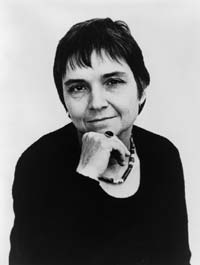
The poet and theorist Adrienne Rich leaves an incomparable legacy of influence and achievement. She has been eloquent and provocative on the politics of gender, sexuality, race, language and power. There is scarcely an anthology of feminist writing that does not include her work or specifically engage her ideas, a critical studies course that does not read her essays, or a poetry collection that does not contain her work. In nineteen volumes of poetry, three collections of essays, the editing of influential journals, and a lifetime of activism and visibility, the work of Adrienne Rich has persistently resonated at the heart of contemporary feminism and its resistance to racism and anti-semitism, militarism and homophobia.
From her first collection of poetry A Change of World selected by the senior poet W. H. Auden for the Yale Series of Younger Poets Award, to her last essay published in 2011, Rich wrote with relentless curiosity and intellect through the significant shifts in both her own life and the socio-political and cultural landscape. While married to Alfred Conrad, and the birth of her two sons, she wrote powerfully about the tropes of domesticity and motherhood. Her career continued to flourish, she won many awards and fellowships, some of which she very famously refused. Rich declined to accept the National Book Award for Poetry in 1974; instead the two other feminist poets nominated, Alice Walker and Audre Lorde, joined her to accept it on behalf of all women.

In 1976, Rich began her lifelong partnership with Jamaican-born novelist and editor Michelle Cliff. Twenty-One Love Poems (1977) marked Rich’s first writing on lesbian desire and sexuality, themes which ran throughout her work afterwards. During this period, Rich also wrote a number of key essays, namely Compulsory Heterosexuality and Lesbian Existence (1980). All the while Rich was a tireless advocate and ally. She never shied away from the difficulties of many forms of anti-oppression work. As an anti-war activist, exploring the complexities of her Jewish identity or hosting Black Panther meetings in her apartment; Adrienne Rich’s life exemplified the intersectionality of politics.
She said of writing: “I think my work comes out of both an intense desire for connection and what it means to feel isolated. There’s always going to be a kind of tidal movement back and forth between the two. Art and literature have given so many people the relief of feeling connected — pulled us out of isolation. It has let us know that somebody else breathed and dreamed and had sex and loved and raged and knew loneliness the way we do.” Adrienne Rich taught us that the personal is the political, and her legacy demands that each of us speaks, from our most personal self, in our loudest voice. In her words, our “language must be used against fitting unexceptionally into the status quo.”
by Revel and Riot Contributor Myra Leibu